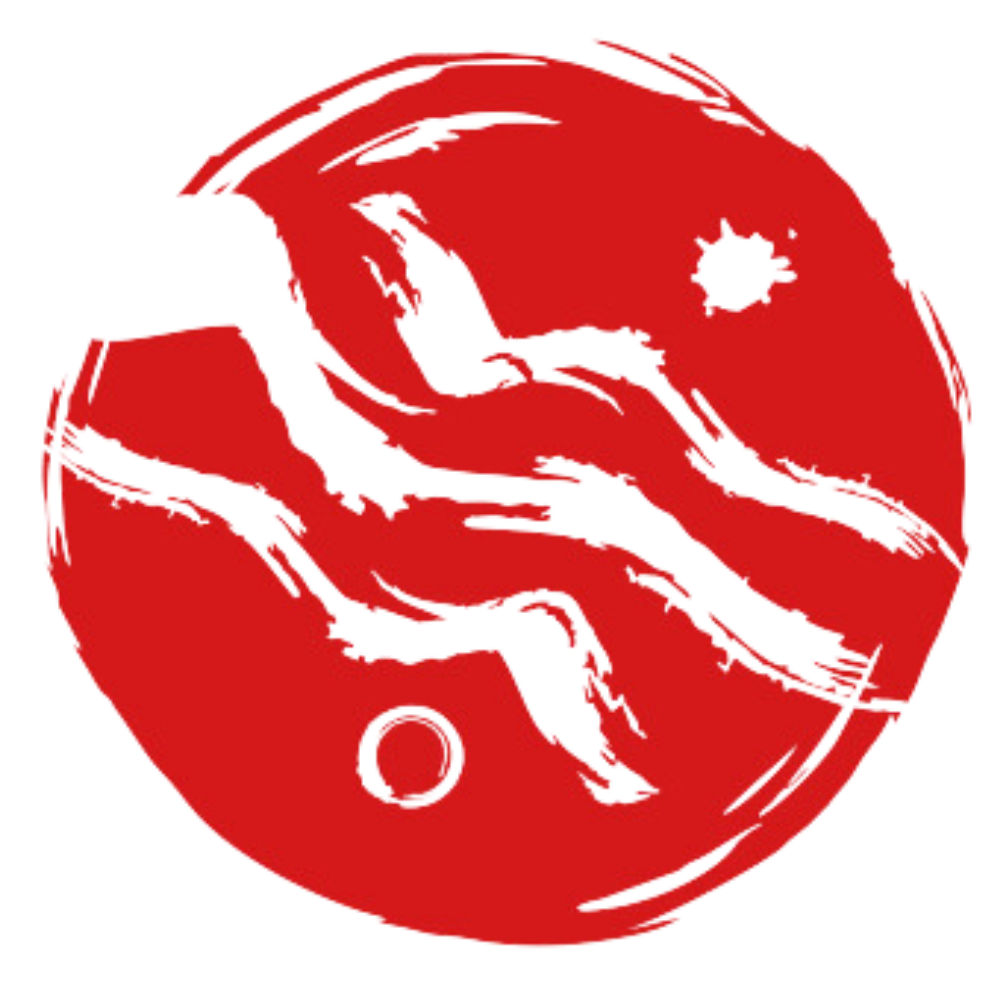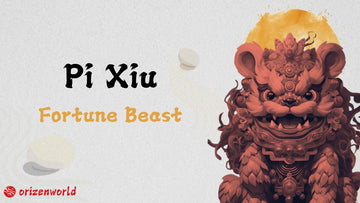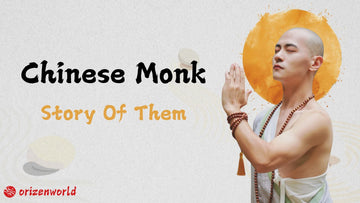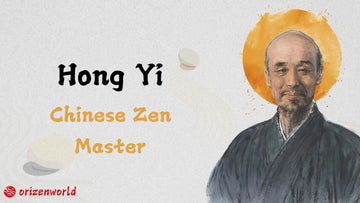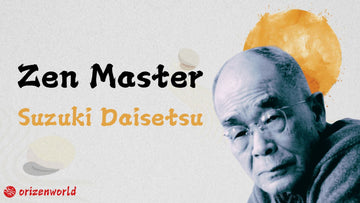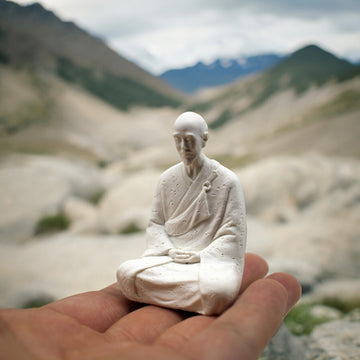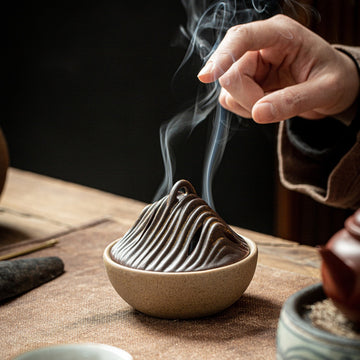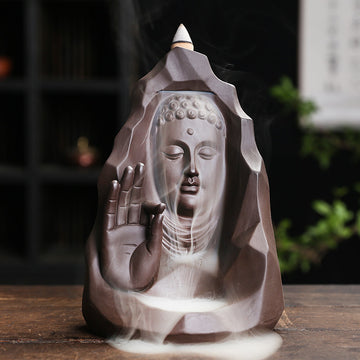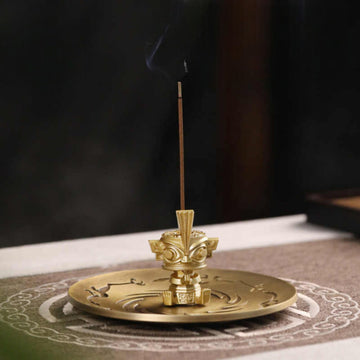Believe it or not, many billionaires from the Greater China region display a mysterious creature called "Pixiu" in their homes or offices. Pixiu is a symbol of wealth and prosperity, deeply rooted in Asian culture and widely regarded as a powerful wealth-attracting entity.

For example, Li Ka-shing, Asia's richest man and a monopoly in Hong Kong, has 888 Pixiu statues in his office. He believes that Pixiu protects his wealth, brings good fortune, and ensures the future success of his business empire.
You might be wondering, what exactly is Pixiu, and why do these wealthy tycoons place such faith in it? Is the Feng Shui theory surrounding Pixiu truly effective?
In this article, I will take you through everything you need to know about Pixiu, so you can better understand why this "Wealth Beast" holds such significance in the lives of these influential business leaders.
Pixiu, also known as Pi Xiu, "Pi Xie," "Tian Lu," or "Bai Jie," is a fierce mythical creature recorded in ancient Chinese texts and folklore. Often referred to as the "wealth beast" or "protective spirit," Pixiu is considered one of the Five Legendary Auspicious Beasts, alongside the Dragon, Phoenix, Tortoise, and Qilin. Unlike any creature in the real world, Pixiu is said to have extraordinary powers and is revered for its role in attracting wealth and warding off evil spirits.

According to legend, Pixiu is the ninth son of the Dragon, endowed with the ability to summon storms, control thunder, and even alter the weather.
PiXiu is believed to be a powerful guardian capable of dispelling negative energy and ensuring peace and prosperity for its owners. As a guardian of wealth, Pixiu is also said to have the power to protect homes from misfortune and bring good fortune.
In terms of appearance, Pixiu resembles a lion or tiger, with a strong, muscular body and an imposing presence. Its head is often depicted as dragon-like, with a single horn curving backward. Pixiu’s body is covered in scales similar to that of a Qilin, with a tail that resembles that of a lion. Remarkably, it has a mouth that is open, symbolizing its ability to consume wealth, but no rear end, representing its role in accumulating wealth without letting it escape.
Pixiu’s color is often depicted as gold or jade, symbolizing its connection to prosperity and protection. While it has wings, they are depicted as unable to spread, perhaps symbolizing its grounded nature and connection to Earthly wealth. The creature’s fierce and imposing look gives it an aura of authority, making it a sought-after symbol in Feng Shui practices.
Due to its powerful symbolism, Pixiu is often placed in homes, offices, and businesses to invite wealth and protect against misfortune. The statue’s appearance and characteristics make it one of the most beloved and revered mythological creatures in Chinese culture, continuously embraced by many for its believed ability to bring fortune and security.
The legend of Pixiu, a powerful and auspicious creature, dates back to ancient China, with its origins believed to trace as far back as the Neolithic era. According to historical records such as Shiji (Records of the Grand Historian) by Sima Qian, during the reign of Emperor Xuanyuan (the Yellow Emperor), fierce beasts, including the Pixiu, were used for training and battle. This suggests that the Pixiu may have been associated with fierce animals like tigers and bears, symbolizing strength and power. These creatures were likely used as totemic symbols for clans, representing their might and protection.
By the Han Dynasty, the image and symbolism of Pixiu had been fully formed and became widely popular. During this period, Pixiu was predominantly crafted in jade, with its design ranging from simple, rustic forms to finely detailed masterpieces. People believed that Pixiu had the power to ward off evil spirits and protect the home, making it a common sight in residences and palaces. Its role as a guardian of safety and fortune became firmly established, and it was often placed at entrances to safeguard against harm.
In the Tang Dynasty, Pixiu’s importance continued to grow, especially among the elite. In the Feng Shi Jian Wen Ji, historical texts from the period note that stone statues of Pixiu were placed in front of imperial tombs. These statues were not only a symbol of the deceased's noble status but also a protective charm to safeguard the tomb and its treasures from thieves and malicious spirits.

This Pixiu statue, located in the Museum of New York, once served as a guardian to protect the tombs of Chinese emperors.
The connection between Pixiu and the imperial family further deepened, as it became associated with royal symbolism. Pixiu’s presence was thought to symbolize the emperor’s dominance over the forces of evil and its ability to control fortune, ensuring the prosperity and stability of the empire. This reinforced its status as a symbol of protection and power.
Today, the legend of Pixiu still carries significant cultural weight in Chinese society. As a revered mythological creature, it remains a symbol of wealth, protection, and prosperity, often depicted in art and used in Feng Shui practices. The Pixiu’s mythological origins, rich in symbolism and historical context, continue to influence its role in modern Chinese culture.
Pixiu, a legendary creature in Chinese culture, holds deep symbolic meaning and is widely used for its beneficial influence in various aspects of life. In Chinese Feng Shui, Pixiu is believed to bring wealth, health, and good fortune. By placing a Pixiu statue in the home or wearing a Pixiu bracelet, individuals can invite positive energy, attracting prosperity and well-being.
Pixiu is most commonly associated with wealth and financial success. It is believed that Pixiu has the ability to consume gold, silver, and treasures without ever letting them go, making it a powerful symbol of wealth accumulation. Business owners and investors often place Pixiu in their offices or stores to attract prosperity and enhance their financial luck.
In addition to its wealth-attracting qualities, Pixiu is also revered for its power to ward off evil and protect its owner from misfortune. The creature's fierce appearance is thought to scare away negative energy and harmful spirits, making it a popular protective symbol in homes and businesses. It is often used in Feng Shui to safeguard the household and ensure the safety of its inhabitants.
Historically, Pixiu was used by Chinese emperors to symbolize power and status. The creature’s majestic form and association with protection made it an ideal decorative element in royal palaces and gardens. It was believed that placing Pixiu statues in these spaces would enhance the ruler's authority and ensure the stability of their reign.
Pixiu is also thought to promote health and longevity. In some traditions, the creature is seen as a guardian against illness, helping to strengthen the body and prolong life. Additionally, Pixiu is believed to help with personal relationships, especially for single individuals, by attracting romantic opportunities and improving social connections.
For those looking to improve their career or academic performance, placing Pixiu in a study or office is considered beneficial. Its presence is believed to enhance focus, productivity, and success in work or studies, making it an ideal companion for those seeking professional advancement or academic achievement.
Activating a Pixiu, known as Kai Guang in Chinese, is an important ritual that imbues the statue with spiritual power, making it an effective tool for wealth and protection. The process of activating a Pixiu is believed to enhance its ability to attract good fortune, dispel negative energies, and establish a strong bond with its owner. This ritual is commonly practiced in Feng Shui to maximize the benefits that Pixiu can offer.
Activating a Pixiu, known as Kai Guang in Chinese, is an important ritual that imbues the statue with spiritual power, making it an effective tool for wealth and protection. The process of activating a Pixiu is believed to enhance its ability to attract good fortune, dispel negative energies, and establish a strong bond with its owner. This ritual is commonly practiced in Feng Shui to maximize the benefits that Pixiu can offer.
There are various methods for activating a Pixiu, and each has its own significance. The most common methods include water activation, natural activation, Taoist priest activation, and Buddhist monk activation.
Water Activation Method: On an auspicious day, first cleanse the Pixiu with water. Then, mix half well water and half rainwater. Place the Pixiu in the sacred water, and let it soak for three days under the midday sun and moonlight. Afterward, dry the Pixiu and apply a small amount of tea oil to its eyes to complete the activation.
Natural Activation Method: This method involves placing the Pixiu in a spot where it can receive both sunlight during the day and moonlight at night for 16 consecutive days. Over this period, the Pixiu naturally absorbs the energy needed for activation.
For those who seek a more formal and sacred method, the Kai Guang ritual can be conducted by a Taoist priest or Buddhist monk. A Taoist priest will perform a ceremonial activation, often by marking the Pixiu’s head with cinnabar or placing a red paper coin on its abdomen, followed by a ritual in front of a sacred altar.
In a Buddhist temple, a monk will bless the Pixiu during a scheduled activation ceremony, after which the owner may take the Pixiu home wrapped in red cloth. Once at home, the owner can remove the cloth and "recognize" their Pixiu by making a personal connection.
Activating a Pixiu is crucial for ensuring its full effectiveness. Without the Kai Guang ritual, the Pixiu may not possess the full spiritual power to attract wealth or protect its owner. By properly activating the Pixiu, you ensure that it aligns with your personal energy and maximizes its ability to bring good fortune, health, and prosperity.
When inviting a Pixiu statue to protect your home or office, proper placement is crucial. Below are some important guidelines for positioning the Pixiu statue, including key taboos that you should avoid to ensure it brings prosperity and protection without any negative effects.
| Placement Location | Guidelines & Benefits | Notes |
|---|---|---|
| 1. Diagonally Facing the Door | - Place Pixiu near the entrance, but not directly facing the door. - Effective for attracting wealth, protecting health, and enhancing financial prosperity. |
- The door is the main entry point for wealth energy. Placing Pixiu diagonally attracts wealth and prevents energy from escaping. - Pixiu can absorb wealth and protect the home. |
| 2. Facing the Window | - Place Pixiu with its head directed toward the window. - Ideal for study rooms or workspaces to increase focus and protect against negative influences. |
- Windows are also considered energy portals. Pixiu will draw in positive energy, enhancing financial luck. - Ensure the Pixiu is activated for maximum effectiveness. |
| 3. In the Living Room | - Living room is a highly auspicious space for Pixiu placement. - Helps transform negative energy into good fortune. |
- This location allows Pixiu to absorb and multiply positive energy. Ideal for improving family luck and protecting against bad Feng Shui. - Also enhances relationships and marital harmony. |
| 4. Avoid Facing a Mirror | - Do not place Pixiu directly in front of a mirror. - The reflection may block Pixiu’s ability to attract wealth and bring bad luck. |
- Mirrors reflect energy, preventing Pixiu from absorbing wealth. - Avoid mirrors in the same line of sight as Pixiu to maintain its wealth-enhancing power. |
| 5. Avoid the Bedroom or Kitchen | - Do not place Pixiu in the bedroom as it absorbs both good and bad energy. - Avoid placing it in the kitchen as the fire element clashes with Pixiu’s water affinity. |
- Negative energy collected by Pixiu can affect health and cause sleep disturbances. - Pixiu is best placed where it can attract wealth and prosperity, not in areas associated with negativity or energy imbalance. |
Pixiu statues come in various forms and styles, with each design reflecting different attributes and symbolism. The most common types of Pixiu are classified based on their head shape, each carrying unique meanings:

Dragon-Head Pixiu (龙头貔貅): This type features a head resembling that of a dragon, symbolizing authority and nobility. Often seen in royal palaces or places of high stature, it is considered a powerful protector and a sign of wealth and power.

Beast-Head Pixiu (兽头貔貅): The most common design, this Pixiu features a head resembling fierce beasts such as tigers, lions, or other mythical creatures. With attributes like large eyes, wide mouths, tusks, and horns, this type is seen as a symbol of courage and protection, particularly for warding off evil spirits and negative energy.

Toad-Head Pixiu (蟾头貔貅): This variation has a head resembling a toad, often with a large mouth and smooth, rounded features. It is believed to bring wealth and good fortune. The toad-headed Pixiu is associated with the ability to attract and retain wealth, making it a popular choice for those seeking financial prosperity.
Pixiu is a versatile feng shui ornament suitable for people of all ages. It not only attracts wealth and ensures good health but also helps to resolve issues related to the "Tai Sui" (grand duke). However, there are some important guidelines to follow when wearing Pixiu. Below is a table outlining the key wearing tips for your reference.
| Tip No. | Tip Title | Details |
|---|---|---|
| 01 | Who Should Wear Pixiu | Pixiu is ideal for: (1) Business Owners: To boost success and attract wealth. (2) Families: To improve luck, drive away evil spirits, and protect the home. (3) People with Fluctuating Incomes: Salespeople, lawyers, traders, and those in finance benefit from its wealth-attracting powers. (4) Transportation Workers: To ward off harmful energy, accidents, and health issues. (5) Couples in Disharmony: To foster harmony and prevent third-party interference. |
| 02 | Wearing Position | Follow the "left in, right out" principle: wear the bracelet on your left hand to attract wealth and on the right hand to ward off evil. If wearing a pendant, ensure the head faces upwards for better energy absorption. |
| 03 | Wearing Time | Wear the Pixiu during the day with the head facing outward to absorb wealth. At night, turn the head inward to keep the wealth for your family. |
| 04 | Maintenance and Care | Do not let others touch your Pixiu. While wearing it, frequently touch it to strengthen your connection with it and enhance its power. |
| 05 | Material Selection | Pixiu can be made from different materials: 1) Metal (gold, silver) – best for business people; 2) Jade – good for women, as it nurtures health and wards off evil; 3) Crystal – popular for various benefits. |
| 06 | Appearance Selection | The type of Pixiu matters: 1) Tilting Head – brings unexpected wealth, ideal for those involved in investments; 2) Straight Head – protects and retains wealth; 3) Open Mouth – absorbs wealth; 4) Closed Mouth – keeps wealth secure; 5) 霸王 – brings prosperity and career success. |
| 07 | Recognizing the Owner | When bringing a Pixiu into your home, it's important to "open its eyes" to acknowledge its owner and activate its wealth-attracting power. This is a traditional practice in Chinese culture. |
